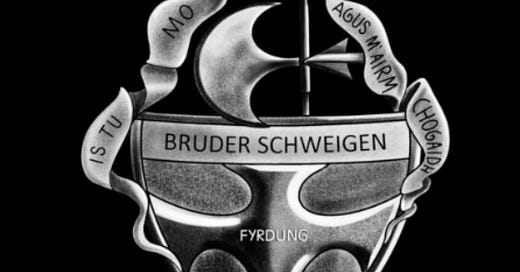The Black Book:
Take the Journey...
“The crucible, whatever the cause or condition – prison or war, hunger or riches – only brings out what resides, already, in the body politic. We are, who we are, long before we awake from that warm, comfortable and hospitable place, which bore us, nurtured us, and protected us. Brought into this world, the rules are already set, the parameters already given us by nature’s guiding hand; we do the best that we can, holding on to those things which seem right, those things which have harboured and sheltered many generations of life before us; this is the history of our past, a thousand generations of trial and error. This is, in its most primal and vital form, the culture in which each race, specific to its origin, is destined to live and die; to succeed or fail, a member of the greater tribe, in which he is but a single part. As another man of Western stock has said:1
“We are born to die and to continue the flow”
This is the natural, organic, state of Nature, which does not smile or frown upon us, each in turn but, rather, embraces whatever we bring as an offering to her. We strive, and in the striving, we realize, as often as not, that we are insignificant when alone; but as we look around, and realize as well, that each of us, you and I, belong to each other creating, as it were, a larger body of works, of strength and unity. We are connected. What affects one can, and does, affect the other, even if the ripples cannot always be seen in the here and now; throughout the ages, what is said and done now (or in the past) will be felt in the future. This is the law of consequence.
The characters present in this work, both historical and personal, are part of a great mosaic, a tapestry which, at present, has not been finished. Ripples, just as the accident which caused them, have consequences unforeseen, or expected, which only end when nature decrees it. This is the beauty of Life, for we can play the hand dealt us, we can figure we know exactly how it will end but, ‘of the plans of mice and men’ there is no knowing. Fate, destiny, pre-destination, whatever one calls it, or believes it to be, the great Author of all our doings is, ultimately, in charge. We can press on, all of us, duty bound to do the best that we can, and in the end, the only thing that matters is that we tried, each of us, to do what was ‘right’ for the betterment of our people – whatever that people - and to the people of the West, that people who bore us, for myself and my comrades, was that which was our first cause.
There will be many instances, in this Volume, in which the personal experiences and world-views will be presented as my own; however, in these experiences, as I experienced them, were also shared, in many cases, by the individual characters presented in this work. There was, of necessity, a certain synchronicity inherent in the lives of these characters, unbeknownst, in large part, to each other, spread out throughout the country and the world.
It should be noted, as well, that Two Volumes were chosen to present this work, as the first volume will provide a necessary (albeit incomplete) background to a general feeling and impulse of a majority of the nation at this time, working its way into the individual lives of the players in this tale; the second volume will offer the tale, as it has become embedded in the popular culture, in its entirety, to the best of my ability, and should provide for easier reading than the first volume.
There are certain historical references to the Russian Revolution, its origins and active participants, which made up a very large part of the world-view of these characters as well. This should be noted and understood in its historical and propaganda value, as the early conservative nationalist outlook; the so-called ‘right wing’, that is to say, those who lived through the first War of Fratricide, and on into the Second, based most of their personal and political antipathy against those revolutionists who, in the last century, destabilized and destroyed many aspects of the Western model of Tradition and Authority, by the very tenacity of their own world-view, as well as their belief in Revolution as a practical necessity, and the ultimate ‘means to an end’, as well as the ultimate arbiter of Power.
This time period affected many in this story, as did the ensuing catastrophe on the same continent many years later. This legacy was left to us – both as a razor and blunt club – and in many respects, sets the political and religious outlook of many of this earlier generation, and finally working its way into our own modern era. Whether one accepts the historicity of this time period (the majority of historians will, however, concur with the origins and evolution of this revolutionary period) is not necessarily the point here, as this work is not a dissertation on ‘history’ proper, yet the overwhelming impetus of this time-period has much to do with the actions and consequences of this story.
The general tone of this work will appear to be that of a generations-long battle against ideological opponents – and so it is.”
__________________
Note:
1 Robert J. Mathews – Speech delivered at the National Alliance, 1984. [emph. mine]




